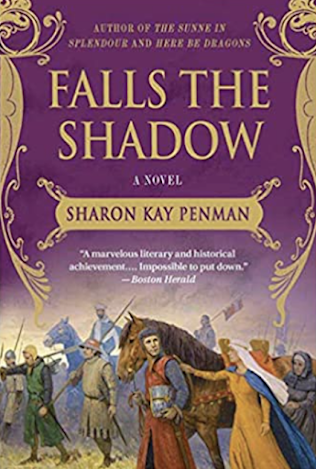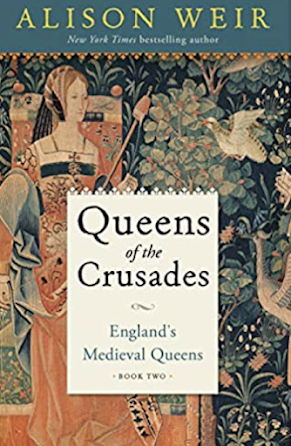Publication Date: October 4, 2011Length: 624 pages
I looked back at my Amazon purchases to see when I actually bought this book. It was March of 2022. I couldn't believe it because I started it the week it arrived. It has taken me a year and a half to read every page and it was worth the time. When I finished it, I felt as if I had lived through every moment of the third crusade along with Richard, Berengaria (his wife and queen), and Joanna (his sister and former Queen of Sicily). It is a masterpiece of storytelling and research.
The first half of the book the main subjects are making their way across Europe to the Holy Land; not necessarily together. We see Joanna, widowed and desperate in Sicily as her former husband's scheming cousin Tancred tries to seize the throne and takes her prisoner in Palermo. She is rescued by Richard as he is traveling to Jerusalem on his crusade to retake the holy city. He frees his sister while subduing Tancred and regaining Joanna's dowry. It is a glimpse into the character and bravery of Richard to come as he stops to exert time and energy into the situation, never doubting his ability to create events to unfold according to his plans.
Joanna and Richard are eventually joined by their mother Eleanor of Aquitaine (whom Joanna has not seen in decades) and Richard's new betrothed, Berengaria of Navarre. Richard, Joanna, and Berengaria continue on their journey to Jerusalem and Eleanor returns to England to deal with brother John and his scheming back home. The journey across the sea to Acre is hardly uneventful as Richard manages to conquer the island of Cyprus along the way, marrying Berengaria there before continuing on their way.
Also traveling to the middle east is Phillip II of France and their whole relationship is one of necessity and dysfunction. Jealousy, greed, and eventually bitterness become the heart of their interactions and as things unfold along the way, the two men and their entourages are embroiled constantly with infighting and suspicion. Neither leader wants to concede power or prestige to the other and their inability to work together to defeat Saladin will be the undoing of the carefully laid plans to retake Jerusalem.
The second half of the novel focuses on what happens after the arrival of the Crusaders in Acre and their many battles, setbacks, victories, and perilous attempts to accomplish their goals. It feels like Richard and Phillip are always one foot forward, two steps back with success and failure. Other major players getting in the way include Hugh III of Burgundy, who always seems to be opposed to whatever Richard decides, the irritating Guy of Lusignan, and Conrad of Montferrat, whom Richard must unwillingly work with in order to secure the Holy Land after he eventually has to leave to return to his place as King of England. At every turn, Richard skillfully works to lead his soldiers, showing no fear, and that he will be right alongside them in the trenches, along with striving to maintain diplomacy between the Crusader leaders and the Muslim factions with whom he often has a cordial relationship. It is a lot for one man to shoulder.
Interspersed between the chapters with Richard as the focus, we see the relationship between Joanna, Berengaria, Richard, and other minor characters. These are nice breaks of quiet domesticity because the intense fighting and political discussions are frequent and require much concentration to follow. I especially loved getting to know the person of Henry II of Champagne, Richard's nephew, who strives to keep the peace between those around him and stay loyal to those he believes in.
This book is incredibly dense with material. There are vivid descriptions of the major battles, the landscape, and the cultures found in Sicily, Cyprus, Tyre, and Acre. Even the first half of the book had me intrigued to find out more about Sicily. I thought I'd be bored by the fact that we don't even arrive in the middle east until halfway through the book, but the battle to conquer Cyprus is so wonderfully told I found myself a bit sad when they finally leave the island.
There is a definite bias Penman displays towards Richard in that she clearly feels he is usually making the correct decisions for those around him. One comes away with the feeling that Richard is stubborn, but thwarted by others, rather than sometimes wrong. She does do a good job of showcasing his inability to be an attentive husband and in that area the reader can't help but side with Berengaria, who is portrayed as loving, sweet, and desperate for a child with Richard. It is this that makes him appear a bit cold and unfeeling with his often one sided obsession with his mission, rarely considering how it all will take a toll on his wife and sister Joanna, who is also often waiting around to see what they will have to endure next.
What really got to the heart of the novel for me though were the last few chapters in which Richard makes a last push at the Battle of Jaffa. The account Penman gives of Richard leading his men and pushing them on despite the odds against them is breathtaking. I could see it all in my mind, could feel the courage and loyalty between him and his soldiers and afterwards I truly understood why he is called Richard the Lionheart. Normally I do not enjoy long, drawn out battle descriptions but this book was superb in this area. She was able to capture everything that makes it an epic: suspense, fear, and victory in the hearts of the men fighting whether they win or lose. That is what makes this book a true gem. I am looking forward to reading A King's Ransom, and seeing how Richard deals with his harrowing journey back to England and his mother Eleanor's fight to save him and his throne from the clutches of his brother John and Phillip of France.















